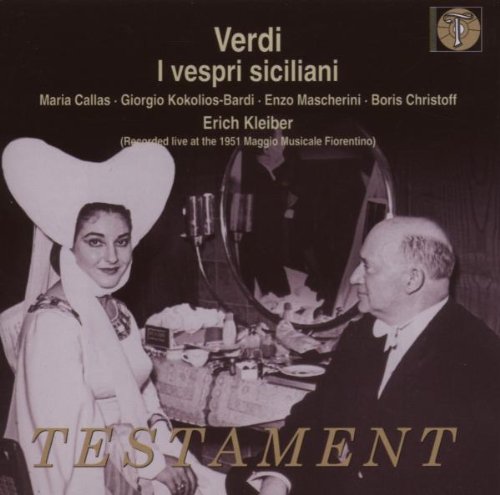Verdi (I) Vespri Siciliani
The cleaned-up sound makes this famous Callas calling card a must
View record and artist detailsRecord and Artist Details
Composer or Director: Giuseppe Verdi
Genre:
Opera
Label: Testament
Magazine Review Date: 1/2008
Media Format: CD or Download
Media Runtime: 0
Mastering:
Mono
ADD
Catalogue Number: SBT21416

Tracks:
| Composition | Artist Credit |
|---|---|
| (I) Vespri siciliani, '(The) Sicilian Vespers' |
Giuseppe Verdi, Composer
Aldo de Paoli, Tebaldo, Tenor Benno Ristori, Manfredo, Tenor Boris Christoff, Procida, Bass Bruno Carmassi, Bethune, Bass Coro del Maggio Musicale Fiorentino Enzo Mascherini, Montforte, Baritone Erich Kleiber, Conductor Gino Sarri, Danieli, Tenor Giorgio Kokolis-Bardi, Arrigo, Tenor Giuseppe Verdi, Composer Lido Pettini, Robert, Baritone Mafalda Masini, Ninetta, Contralto (Female alto) Maria Callas, Elena, Soprano Mario Frosini, Vaudemont, Bass Orchestra del Maggio Musicale Fiorentino |
Author: po'connor
This recording, like Verdi’s opera, has attracted mixed reviews over the years. Composed for Paris in 1855, Les Vepres siciliennes has never enjoyed the affection of critics or public in the way the other “mid-period” operas (Boccanegra, Ballo and Forza) have.
This revival was one of the productions that helped to spread Maria Callas’s fame. At the time, Lord Harewood wrote memorably in Opera magazine about the tremendous force she puts into the recitative in Act 1, in which the Duchess Elena encourages the Sicilian population to rebellion with the words “Il vostro fato e in vostra man” (“Your fate is in your own hands”).
Callas is terrific in the Act 1 aria and cabaletta, as well as in the long duet with Arrigo in Act 4, sung by Greek tenor Giorgio Kokolios-Bardi. He had been one of Callas’s leading men at the National Opera in Athens, and she particularly requested him for this part. He’s no Di Stefano but he gives a good performance, especially of the aria in the fourth act, “Giorno di pianto”. In some ways this opera is dominated by the two low male voices – Boris Christoff is magnificent as the gloomy, unforgiving Procida, while Enzo Mascherini is in his element as the anguished Guido di Montforte, who finds out too late that his opponent is his own son.
Erich Kleiber is not usually associated with the 19th-century Italian repertory but he leads a vigorous performance, although there are quite a few cuts. This tape (made for Walter Legge) does not include the overture, so the opera fits on two CDs. For Callas and Christoff admirers, of course, this is an essential document. Although the sound quality is variable, it is clearer than previous issues. The Testament booklet is excellent, the libretto available to download from the company’s website.
This revival was one of the productions that helped to spread Maria Callas’s fame. At the time, Lord Harewood wrote memorably in Opera magazine about the tremendous force she puts into the recitative in Act 1, in which the Duchess Elena encourages the Sicilian population to rebellion with the words “Il vostro fato e in vostra man” (“Your fate is in your own hands”).
Callas is terrific in the Act 1 aria and cabaletta, as well as in the long duet with Arrigo in Act 4, sung by Greek tenor Giorgio Kokolios-Bardi. He had been one of Callas’s leading men at the National Opera in Athens, and she particularly requested him for this part. He’s no Di Stefano but he gives a good performance, especially of the aria in the fourth act, “Giorno di pianto”. In some ways this opera is dominated by the two low male voices – Boris Christoff is magnificent as the gloomy, unforgiving Procida, while Enzo Mascherini is in his element as the anguished Guido di Montforte, who finds out too late that his opponent is his own son.
Erich Kleiber is not usually associated with the 19th-century Italian repertory but he leads a vigorous performance, although there are quite a few cuts. This tape (made for Walter Legge) does not include the overture, so the opera fits on two CDs. For Callas and Christoff admirers, of course, this is an essential document. Although the sound quality is variable, it is clearer than previous issues. The Testament booklet is excellent, the libretto available to download from the company’s website.
Discover the world's largest classical music catalogue with Presto Music.

Gramophone Digital Club
- Digital Edition
- Digital Archive
- Reviews Database
- Full website access
From £8.75 / month
Subscribe
Gramophone Full Club
- Print Edition
- Digital Edition
- Digital Archive
- Reviews Database
- Full website access
From £11.00 / month
Subscribe
If you are a library, university or other organisation that would be interested in an institutional subscription to Gramophone please click here for further information.




